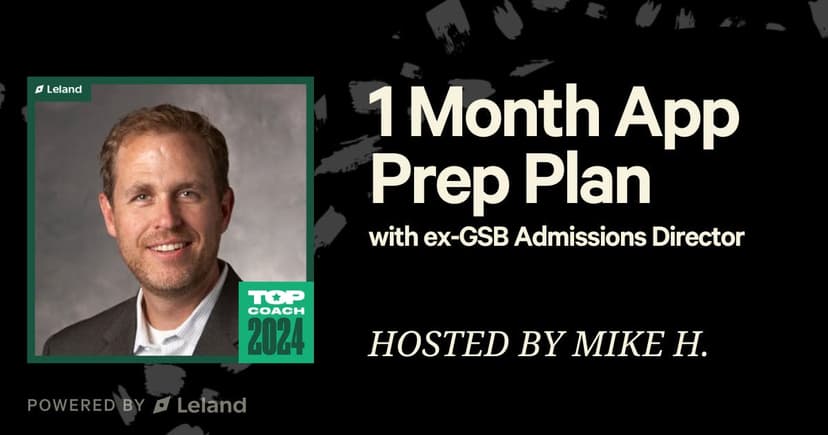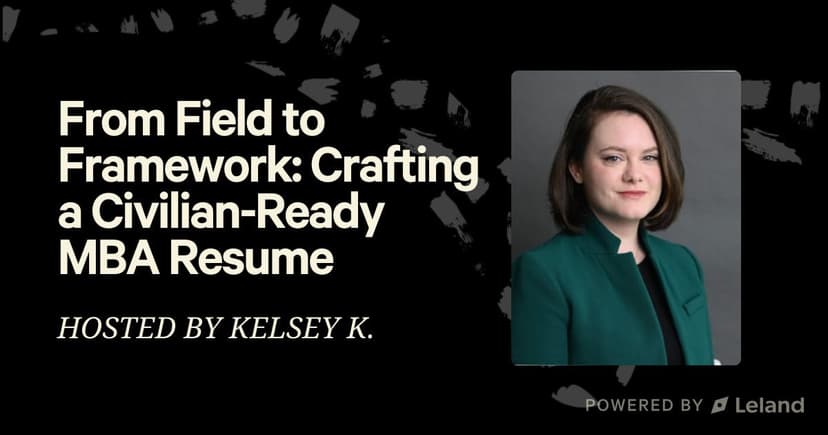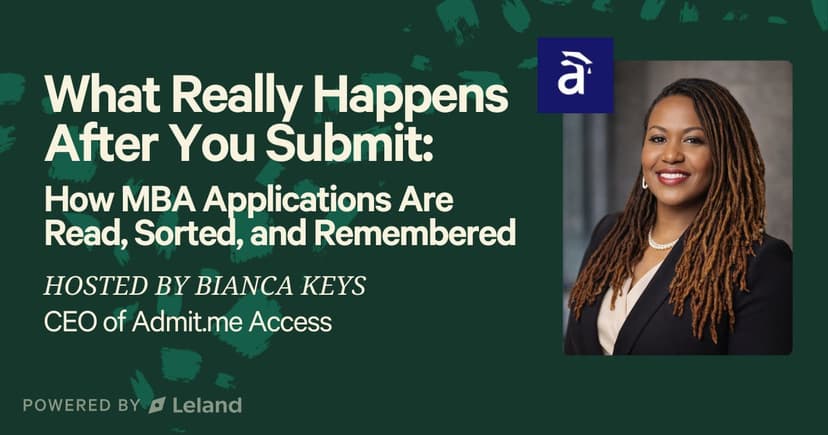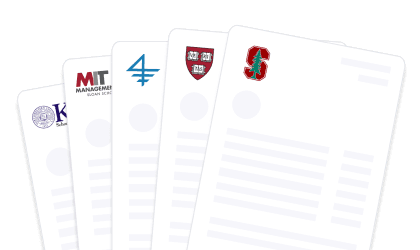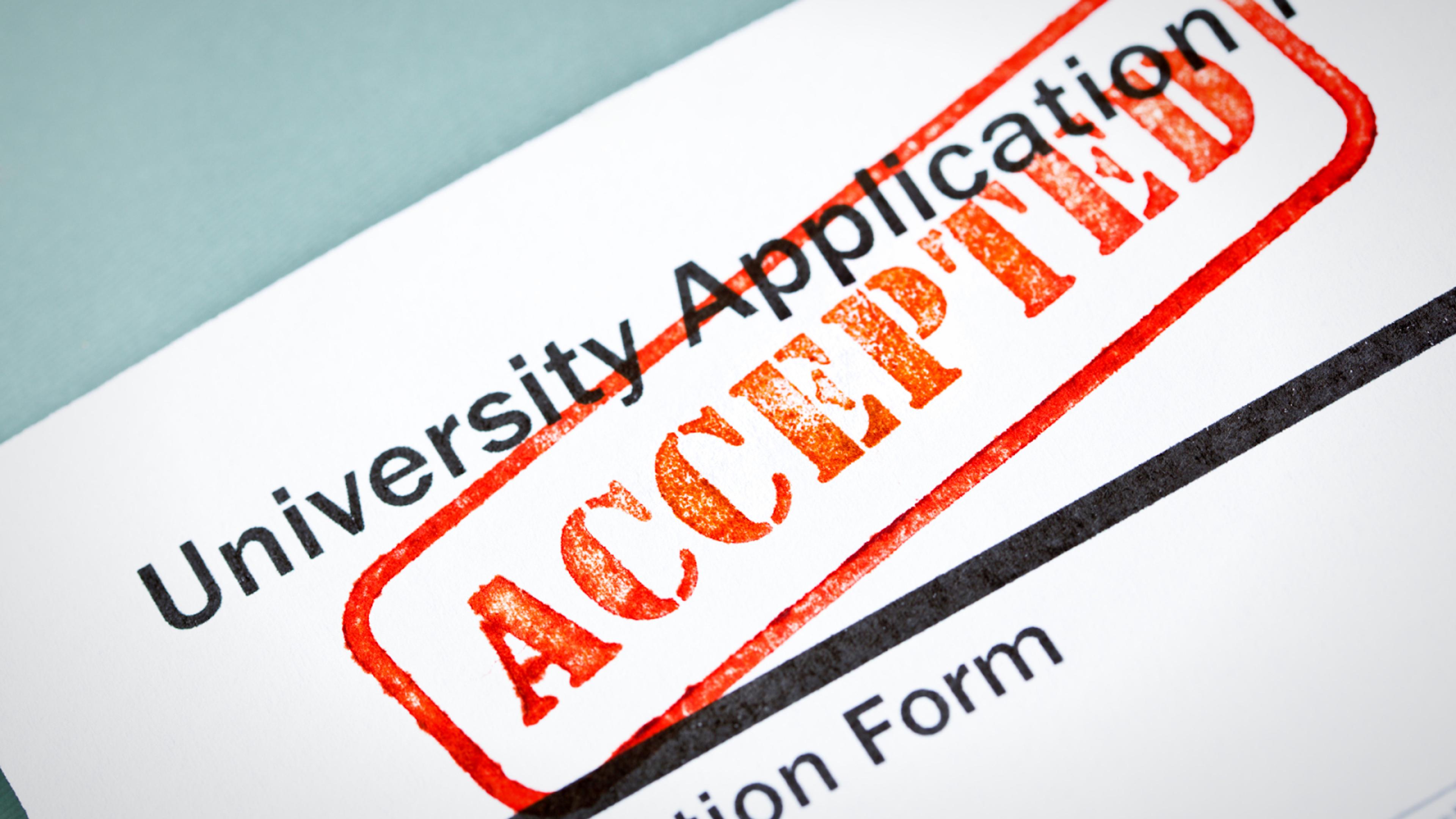MBA Recommendation Letter Guide: Examples, Templates, and Writing Tips (2025)
Learn how to craft a strong MBA recommendation letter with expert examples, templates, and tips to impress top business schools in 2025.

By Melanie E.
✍️ Essay Concierge |🚀 Ad Comm | 🎯200+ M7 Admits | 🎓 Columbia MBA Expert
Posted October 23, 2025

Join a free event
Learn from top coaches and industry experts in live, interactive sessions you can join for free.
Table of Contents
Why MBA Recommendation Letters Matter
When it comes to MBA recommendation letters, few understand their power and pitfalls better than Melanie E., a Columbia MBA alumna, current CBS Admissions Interviewer, and seasoned essay coach who has helped over 200 applicants gain admission to M7 schools. With a rare combination of insider admissions experience, executive coaching certification, and a deep editorial background, Melanie brings a storytelling-driven approach to the entire MBA application. “A recommendation letter isn’t just a formality, it’s a window into your real-life leadership,” she explains. If you're unsure who to ask, what to prep, or how to make sure your letters actually strengthen your candidacy, Melanie’s guidance can make all the difference.
You can craft the perfect essays, ace the GMAT, and polish your resume to a shine, but if your MBA recommendation letters fall flat, admissions officers will notice. These letters are one of the few parts of your application you don’t control directly, yet they carry enormous weight in shaping how schools see you as a candidate.
The good news? You have more influence than you think. From choosing the right people to prepping them with the right context, you can help ensure your recommenders write letters that are thoughtful, specific, and compelling. In this guide, we’ll walk you through everything: who to ask, how to ask, what schools are really looking for, and how to avoid the most common mistakes MBA applicants make with their letters.
About the Author
I'm a professional MBA admissions consultant, former admissions officer, and MBA interviewer who's helping over 200 applicants get into M7 schools. I have over a decade of coaching experience and have seen great, good, and awful recommendation letters. I can help you figure out who to ask, how to prep them, and how to make sure you get as strong of letters as possible. If you'd like personalized support, book a free intro call on my profile.
What Is an MBA Recommendation Letter? (And Why It Matters)
An MBA recommendation letter is one of the few chances for someone else to vouch for your character, leadership, and potential. Typically written by a direct supervisor or someone who’s seen you in action professionally, this letter gives admissions officers insight into how you operate in the real world.
Most business schools follow a similar format for their letters, and many, including those aligned with the Graduate Management Admission Council (GMAC), ask recommenders to respond to open-ended questions that reveal how you lead, collaborate, and grow. These letters don’t just confirm what’s on your resume. They help schools understand who you are as a teammate, a leader, and a prospective student.
MBA Common LOR
A common LOR (letter of recommendation) will usually answer open-ended questions posed by each school, such as:
- How does the applicant compare to other well-qualified individuals?
- Describe the applicant’s role, responsibilities, and achievements.
- Provide specific examples of their leadership, teamwork, and impact.
- What constructive feedback have you given the applicant, and how did they respond?
Download the Common LOR Sample Instructions here.
How the MBA LOR Is Used in the Admissions Process
MBA admissions officers use letters of recommendation to validate what applicants say about themselves and to uncover traits that are harder to measure, like emotional intelligence, resilience, and influence. A strong letter offers authentic insight and provides a better understanding of how you operate in professional settings.
How Many MBA Letters of Recommendation Do You Need?
Most top MBA programs require two letters of recommendation, typically from professional sources.
Here’s a quick look at how many letters are required by the M7 business schools:
| School | Number of Recommendations | Notes |
|---|---|---|
| Harvard Business School (HBS) | 2 | At least one from a current manager/supervisor. If not possible, a former supervisor or another professional contact is acceptable. |
| Stanford Graduate School of Business (GSB) | 2 | One from your current direct supervisor (or next best alternative); the other from someone else who has supervised you. |
| Wharton School | 1 | From an individual well acquainted with your performance in a work setting, such as a current or former supervisor. |
| Chicago Booth | 2 | One should be from a current supervisor in a professional capacity; the other can be from an individual who has worked with you professionally. |
| Kellogg School of Management | 2 | One from your current supervisor or manager; the second from someone who can evaluate your professional performance and leadership potential. |
| Columbia Business School | 1 | Preferably from a current manager/supervisor. If not possible, a former direct manager or a senior colleague is acceptable. |
| MIT Sloan | 1 | Preferably from a professional contact, such as a current or former supervisor. |
To see specific questions asked of some MBA programs, take a look at our article: MBA Recommender Questions and Criteria for the Top 10 Business Schools
Note: Some schools also include a recommendation form with specific questions.
Can You Submit More Than the Required Number of Recommendations?
Generally, no, and doing so can hurt more than help. MBA programs want thoughtful, well-chosen letters that add a new perspective to your application. Submitting more than the required number (usually 1–2) can dilute your message, create confusion, or signal that you’re trying too hard to compensate elsewhere.
That said, there are a few exceptions:
- Optional academic letter: If you’re applying directly from undergrad and one of your letters is academic by necessity, some programs may allow a third letter from a professional contact to round things out.
- Explicitly allowed by the school: Some programs, like Yale SOM or Tuck, may offer the option of an additional recommender in special cases, but only submit one if it truly adds distinct value and context (e.g., showing leadership in extracurricular activities or impact across different organizations).
- Programs that invite “other well-qualified individuals” to comment: This is rare; always check the school’s instructions carefully before assuming more is better.
Expert Tip: If you have multiple strong supporters, ask one or two to endorse you informally, perhaps in an email or networking touchpoint with the school, rather than submitting a full letter that might not be read.
Who Should You Ask for an MBA Recommendation?
Your current supervisor is usually the top choice, especially if the school explicitly requests it. If that’s not possible (due to job risk or other dynamics), consider:
- A former manager from a previous role
- A senior colleague or team lead who worked closely with you
- A client or cross-functional partner
- For early-career MBA applicants: a professor and a professional contact
The key is that the person knows your day-to-day work, can speak to your successful leadership assessment, and can provide specific examples of how you’ve made an impact. They should know you very well and be able to attest to who you are as a person.
Many MBA candidates struggled with whether to ask a current boss or someone they trust more. Consensus: go with whoever will write the strongest, most supportive letter, even if it’s a former supervisor.
Expert Tip: Never sacrifice how well your recommender knows you for prestige. If you have the choice between someone who’s more senior or has an MBA from the school but doesn’t know you well and someone who may not have that alumni status but knows you deeply, always go with the latter. The best recommenders are very personal and testify to who you are as a human being.
How to Ask for a Recommendation Letter (Email Scripts + Templates)
Give your recommender ample time, ideally 1-2 months before the deadline. When you ask, be clear, respectful, and explain why you’re asking them. Offer to make the MBA application process easy with helpful materials.
Expert Tip: It can be better to take your potential recommenders out to a quick coffee or lunch chat before sending a formal email. Say something along the lines of, “I’ve been thinking about applying to MBA programs this fall and wanted to get your thoughts, and also see if you might be open to writing a recommendation. I really value your perspective, especially given how much I’ve grown under your leadership.” Then, gauge their reaction. Are they excited? Do they seem genuinely supportive? You want a recommender who’s not just willing, but enthusiastic, someone who will advocate for you with specificity and conviction. If they seem hesitant or vague, you may want to reconsider who you choose.
Email Template
Subject: Letter of Recommendation Request for MBA Programs
I'm reaching out because I'm applying to a few MBA programs this fall, and I'd be truly honored if you'd consider writing one of my recommendation letters. You've seen me grow at [Company] across some of my most formative years, especially in [project/team/initiative], where your feedback and leadership helped me push into new territory.
I believe your perspective on my growth in [e.g., leadership, analytical thinking, team development] would offer admissions committees a unique window into how I operate in high-stakes, collaborative environments. I’ll make the process easy. I’m happy to send over a one-pager with my goals, the programs I’m applying to, and a few talking points you might find useful.
I completely understand this is a time commitment, so no pressure at all, and please feel free to say no. If you're open to it, I’d ideally need the letter submitted by [insert general date/timeline].
Thank you either way. I’ve learned a lot from working with you, and I really appreciate your support.
Warm regards,
[Your Full Name]
[Your Contact Information]
What Makes a Strong Letter of Recommendation for MBA Programs?
A strong MBA letter of recommendation doesn’t just check a box. It helps admissions officers see you through the eyes of someone who’s worked closely with you, and who can vouch for the kind of leader, teammate, and person you are.
What separates a solid letter from a standout one is whether it:
It tells real stories, not just compliments.
The best letters don’t just say you’re a strong performer; they show it. Think of moments where you led under pressure, solved a tough problem, or earned trust from your team. These specific examples bring your application to life in a way a resume never could.
It goes beyond your job title.
Admissions officers already know your role. What they want to understand is how you did the job. A great recommender will talk about the impact you made, how you made others better, and what you brought to the table that was different from your peers.
It shows how you work with others.
B-schools care deeply about how you lead and collaborate. Letters that mention your ability to give and receive feedback, stay calm under stress, or support your teammates can say a lot about your leadership potential, even if they’re subtle moments.
It connects to your future goals.
If your recommender understands where you’re headed, they can help admissions officers see why you’re ready for an MBA now. Whether it’s a long-term goal or a next career move, a letter that speaks to your trajectory makes you feel like a candidate with direction.
It puts your performance in context.
Most schools ask for some kind of comparison, like how you rank against others they’ve managed. This might feel awkward to ask for, but it’s one of the most persuasive parts of a letter. Saying you’re one of the best they’ve worked with in 10 years (and why) carries real weight.
What to Avoid: Common Mistakes in MBA Letters of Rec
We’ve seen thousands of good – and bad – letters of recommendation. Here are some of the most common mistakes that applicants make, and what to do differently.
Generic praise without concrete examples.
Statements like “She’s a strong leader” or “He’s very intelligent” mean nothing without evidence. Top programs want vivid, story-driven accounts that prove impact through action. A great letter should read like a case study: what challenge did the applicant face, what did they do, and what was the result?
Rehashing the resume instead of adding a new perspective.
Admissions committees already have your resume. What they don’t have is the recommender’s unique lens. Strong letters provide behind-the-scenes context: how the applicant operates in a team, how they respond to feedback, and how they’ve grown. If the letter doesn’t teach the reader something they couldn’t learn from other materials, it’s a missed opportunity.
Using vague, templated, or interchangeable language.
Phrases like “a pleasure to work with” or “would be an asset to any program” signal low effort and low conviction. The best letters are specific to this person, this recommender, and this relationship. A good litmus test: Could this letter be sent to five other candidates? If so, it’s not strong enough.
Recycling the same letter across schools.
Every MBA program has a distinct culture, pedagogy, and evaluation rubric. A recommender who understands this can subtly tailor the letter to emphasize traits that each school uniquely values, whether that’s analytical rigor, principled leadership, or global fluency. Even small references to the program’s ethos or curriculum show intentionality.
Failing to directly answer the school’s prompts.
Most top programs include open-ended but targeted questions – e.g., "What is the applicant’s most significant piece of feedback?" or "How do they compare to peers?" Ignoring these or answering them obliquely reflects poorly on both the recommender and the applicant. The best recommenders treat each question as a high-stakes mini-essay.
Letters that are unusually short, rushed, or impersonal.
A two-paragraph letter that feels like a formality is a red flag to admissions officers. Great recommendations demonstrate effort, thoughtfulness, and familiarity. If a recommender doesn’t have the time or context to write a thorough letter, it’s better to find someone else than risk a weak endorsement.
Write the letter yourself.
It may be tempting to “draft” the letter for your recommender, but admissions readers can almost always tell. Ghostwritten letters tend to read flatter, over-polished, or suspiciously aligned with application essays. More importantly, schools view this as a serious breach of ethics that could jeopardize your application. Your recommender’s genuine voice and judgment are part of the evaluation.
Example MBA Recommendation Letters & Template
Here is a full example letter of recommendation for Maya, a Product Manager:
1. Please provide a brief description of your interaction with the applicant and, if applicable, the applicant’s role in your organization.
I had the pleasure of managing Maya [Last Name] for just over two years while she served as a Senior Product Manager on my team at [Company], a healthcare data infrastructure startup. She reported directly to me and owned one of our most complex product lines – an interoperability platform used by enterprise clients to streamline provider credentialing. Maya joined [Company] shortly after our Series B and quickly became a critical cross-functional leader, interfacing with engineering, data science, customer success, and compliance to bring new products to life.
2. How does the performance of the applicant compare to that of other well-qualified individuals in similar roles? Please provide specific examples.
Maya is one of the top two product managers I’ve worked with across my 12 years in healthcare tech, which includes roles at [Company] and [Company]. What sets her apart isn’t just competence; it’s her clarity of thinking, strategic empathy, and ability to lead without relying on authority.
As an example, in early 2022, Maya was tasked with rebuilding our provider search API, which had a 48% error rate and was the source of repeated client complaints. Rather than defaulting to internal assumptions, she conducted over 30 hours of qualitative interviews with users ranging from insurance brokers to hospital admins. She synthesized those insights into a product vision that prioritized transparency and explainability over speed, contrary to our initial hypothesis. The result was a 63% drop in support tickets, a new enterprise contract with one of the nation’s largest health systems, and – perhaps most telling – a product teardown by a competitor who cited it as “unexpectedly delightful.”
Maya’s peers consistently sought her out not just for her PM skills but her judgment. She has a gift for simplifying complexity, asking the right second-order questions, and rallying people around purpose. During our transition to a matrixed org structure, I watched her mentor two newer PMs while managing a difficult engineer relationship, never losing trust or velocity. Her combination of intellectual rigor and emotional steadiness is incredibly rare.
3. Describe the most important piece of constructive feedback you have given the applicant. Please detail the circumstances and the applicant’s response.
In Maya’s first year, one piece of feedback I gave her was to widen her aperture of ownership. While she was extraordinarily effective in her immediate scope, I wanted her to think more like a GM – connecting product choices to company-level levers like margin, customer acquisition cost, and LTV.
She took that feedback seriously and acted fast. Within a quarter, she partnered with our Head of Finance to build a margin model for our new tiered pricing plans, ultimately influencing how we bundled products. More than that, she proactively joined customer sales calls to better understand deal blockers and began mentoring two junior PMs on strategic tradeoffs, not just Jira grooming.
Her response to feedback is one of the most impressive parts of her leadership style. She doesn’t just “accept” it; she integrates it. Maya actively seeks clarity, reflects, and iterates. It’s the kind of growth mindset I’ve rarely seen executed at this level, and one of the reasons I believe she’ll be an extraordinary contributor to any MBA cohort.
Closing Statement
Maya has my strongest recommendation. She is a principled, curious, and deeply competent leader who elevates everyone around her. I would hire her again in a heartbeat and fully expect her to be among the most thoughtful future builders in healthcare. I am confident she will not only thrive in an MBA program like Stanford or HBS but also enrich it through the depth of her experience and character.
For 100+ more sample applications, including letters of recommendation, check out Leland+.
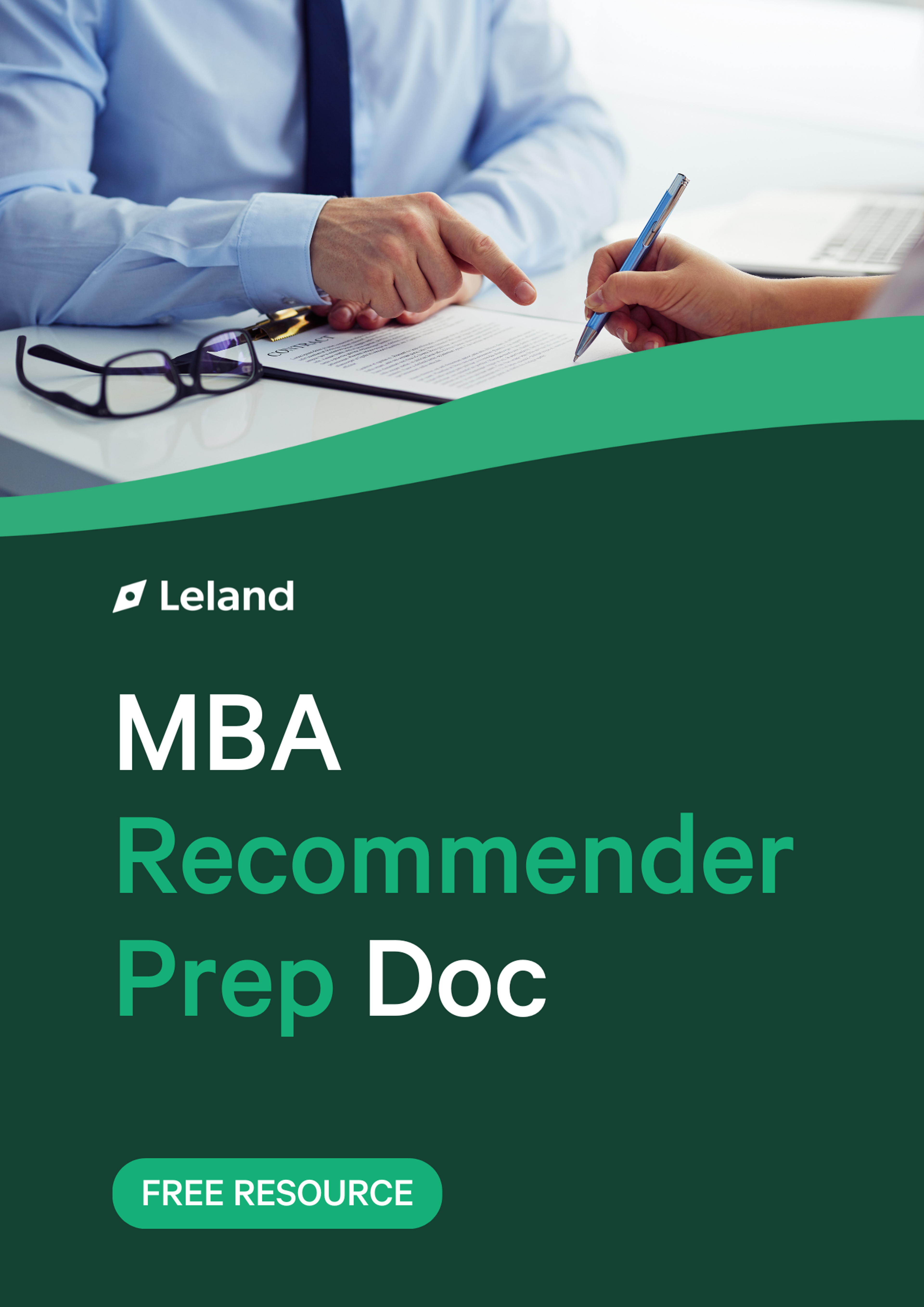
MBA Recommender Prep Doc
Download our free recommender prep doc used by thousands of applicants to get the strongest possible letters of rec.
Common Situations & What to Do
What if I can’t get a letter from my direct manager?
This is more common than you think, especially if you’re applying confidentially or don’t have a close relationship with your manager. Schools understand, just explain the situation briefly in the optional essay, then choose a former manager, senior colleague, or client who knows your work well and can provide specific examples of your impact.
What if my recommender asks me to write the letter for them?
Resist the urge to say yes, even if they’re busy or unsure what to say. Instead, offer to help by sharing your resume, career goals, project highlights, and a brief summary of what schools are looking for. It’s fine to guide the process, but the final letter should reflect their voice and perspective, not yours.
What if I’m not sure they’ll write me a strong letter?
Trust your gut here. A vague or lukewarm letter can quietly undermine your application. You’re better off choosing someone who knows your strengths, believes in your potential, and can speak with genuine enthusiasm. If you have any doubts, find someone else who can write a letter that truly supports your candidacy.
Final Tips for Managing the Process (Without Micromanaging)
Once you’ve picked your recommenders, your job isn’t over, but it’s not to hover, either. Your role is to make their job as easy as possible while setting them up to write a letter that truly reflects who you are. Here’s how to do that well:
1. Start early, not just out of politeness, but strategy.
Give your recommenders at least 4–6 weeks. Great letters take thought, and rushed ones often sound... rushed. The earlier you ask, the more time they’ll have to reflect, write, and tailor it to each school if needed.
2. Give them the right tools.
Share your resume, a brief overview of your career goals, and a quick summary of the MBA programs you’re applying to. If you’ve worked on big projects together, remind them. A good recommender wants to write you a great letter; you just have to help them remember the details.
3. Prep without overstepping.
You can absolutely offer a short “cheat sheet” or prep doc with highlights of your achievements, context for your goals, and even reminders of specific examples they might mention. Just don’t script it. Think of it as supporting them, not steering them.
4. Set a clear timeline, and follow up once.
Let them know when your deadlines are and build in some buffer time. A gentle check-in a week or two before the deadline is totally fair. But trust them to get it done. If you’ve chosen the right person, you shouldn’t need to chase them. Click here for A Comprehensive MBA Application Timeline.
5. Always say thank you
This one matters more than people think. Whether it’s a handwritten note, a thoughtful email, or even a follow-up update after you get in, closing the loop shows gratitude and keeps the relationship strong for future mentorship, references, or opportunities.
The Bottom Line
You can submit a flawless resume, write compelling essays, and crush your GMAT, but if your MBA recommendation letters are vague, generic, or rushed, they’ll quietly weaken your entire application. These letters are one of the few parts of the process that you don’t control directly, yet they carry significant weight in how admissions committees perceive your leadership, character, and potential. The good news is that you have more influence than you think. By choosing the right people, preparing them with the right context, and ensuring they understand what schools are really looking for, you can turn your letters of recommendation into a powerful asset. Experts like Melanie E., a Columbia MBA alumna, CBS Admissions Interviewer, and coach to over 200 M7 admits, understand exactly what makes a letter stand out. With the right strategy and guidance, your recommenders can elevate your application in ways you can’t do alone.
Get 1:1 Help with Your MBA Recommenders
Letters of recommendation are stress-inducing for a lot of applicants because they're not something that they can immediately control. Still, there are several ways to set yourself up for a strong, supportive letter. For one-on-one custom help personalized to your background, target schools, and timeline, reach out to me! I've helped hundreds of applicants get admitted to top schools, and I'd love to help you, too.
Work with a coach to nail your letters of recommendation and book a free intro call here.
Read:
- The 10 Best MBA Admissions Consultants
- MBA Essay Examples & Tips (From an AdCom)
- MBA Resume Tips, Examples, & Template – From an Ex-AdCom
- How to Ace Your MBA Interview: With Prep Questions & Answers
FAQs
What is the GMAC Common Letter of Recommendation, and which schools use it?
- The GMAC Common Letter of Recommendation (LOR) is a standardized form designed to streamline the recommendation process for MBA applicants and their recommenders. It includes sections like a leadership assessment grid and open-ended questions about the applicant's performance and potential. Many top business schools, including Stanford, Wharton, and MIT Sloan, accept this format.
Is it acceptable to ask the same person to write recommendations for multiple MBA programs?
- Yes, it's common for applicants to request multiple letters from the same recommender. However, it's important to ensure that each letter is tailored to the specific program. Providing your recommender with a prep document that outlines each school's values and what they seek in candidates can help them customize their letters accordingly.
What should I do if my recommender asks me to draft the letter myself?
- While it's not uncommon for busy professionals to request this, it's crucial to maintain the integrity of the recommendation process. Politely decline to write the letter yourself. Instead, offer to provide a detailed overview of your achievements, career goals, and examples of your work to assist them in crafting the letter.
How do I choose between a senior executive and someone who knows my work well?
- Admissions committees value depth over hierarchy. A detailed letter from someone who has closely supervised your work and can provide specific examples is more impactful than a generic letter from a high-ranking executive who doesn't know you well.
What are the common questions recommenders are asked to answer?
- Recommenders are typically asked to discuss how they know you, compare your performance to peers, provide examples of your leadership and teamwork, and describe any constructive feedback they've given you and your response to it.

Written by Melanie
5.0
(69)
🚀As a Multi-Dimensional Coach, Melanie ties together the rigor of the executive world with the flow of the spiritual to transform your personal, professional, and academic life. Whether you’re looking to navigate the competitive MBA admissions process, enhance your leadership capabilities, or discover your life’s purpose, Melanie helps you unlock your full potential across all areas of your life. With over 18 years of experience (as of 2025), Melanie brings a powerful and unique blend of strategic business insight, coaching, and holistic healing arts to help you achieve your most ambitious goals. Her services include: 🌱 Life Coaching: Melanie empowers you to create meaningful change in your personal life by helping you overcome mental blocks, build confidence, and align with your true potential. Together, you will focus on self-discovery, mindset transformation, and purpose-driven living. ✨ Healing Arts: Through energy healing (Reiki), somatic coaching, tarot, and intuitive guidance, Melanie helps you clear mental and emotional blocks, align with your true purpose, and experience lasting transformation. 💼 Executive Coaching: Melanie utilizes her McKinsey toolkit and coaching methodologies to enable you to make powerful decisions, enhance your executive presence, and drive success. She is the author of the proprietary Espeland Method™ for executive presence. 🎓 MBA Admissions Coaching: As a Columbia MBA alumna and MBA Admissions Interviewer, Melanie has successfully helped 200+ applicants gain spots at top-tier schools like Columbia, Stanford, Harvard, and more. Together, you will craft a unique story that helps you stand out in the admissions process. ****** 📺Recognition: Melanie has been featured in Forbes, NBC, ABC, CBS, Business Insider, TEDx, and more. She has worked with prominent corporate clients including Google, Meta, IBM, and Morgan Stanley; as well as individuals such as business leaders, influencers, and Olympic athletes. ****** 👩🏻Biography: Melanie started her career working in fashion for several iconic brands including Diane Von Furstenberg, Alice + Olivia, and Elie Tahari. She later became a management consultant with McKinsey & Company where she advised F500 companies on strategy and operational improvement initiatives. Following her time at McKinsey, she was a Senior Lead in charge of Strategy and Innovation for Macy’s, the multi-billion omni-channel retailer. Melanie earned an MBA from Columbia University and a BS from Cornell University. She currently lives in Los Angeles and enjoys creative pursuits in her free time.
Melanie has helped clients get into organizations like:


